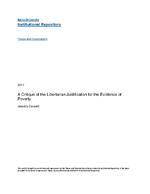|
|

Notes
- Abstract:
- The United States has one of the highest levels of poverty of all first world countries. The existence of poverty in first world countries, however, presents a philosophical dilemma—how is it that people are poor in a society with an overabundance of resources. The purpose of this project is to examine different theories of justice that establish a principle for the distribution of economic resources, and analyze each one as it relates to the issue of poverty within first world countries, particularly, the United States. More specifically, I will critique two Libertarian theories of justice which, in sum, argue that in a just state, the government does not have a moral obligation to eliminate poverty. The goal of my critique is to explain why the arguments presented in favor of the Libertarian claim demonstrate inconsistency, and are thus necessarily false. Then, I will appeal to the works of James Sterba and John Rawls in forming a moral basis for the State’s moral obligation to alleviate poverty.
- Thesis:
- Thesis (Honors)--Barry University, 2017.
- Bibliography:
- Includes bibliographical references (leaves 34-36).
Record Information
- Source Institution:
- Barry University
- Holding Location:
- Barry University Archives and Special Collections
- Rights Management:
- Copyright Jessica Cousett. Permission granted to Barry University to digitize, archive and distribute this item for non-profit research and educational purposes. Any reuse of this item in excess of fair use or other copyright exemptions requires permission of the copyright holder.
- Resource Identifier:
- HC79.P6 C68 2017_CousettJessica ( BU-Local )
- Classification:
- HC79.P6 C68 2017 ( lcc )
|
|